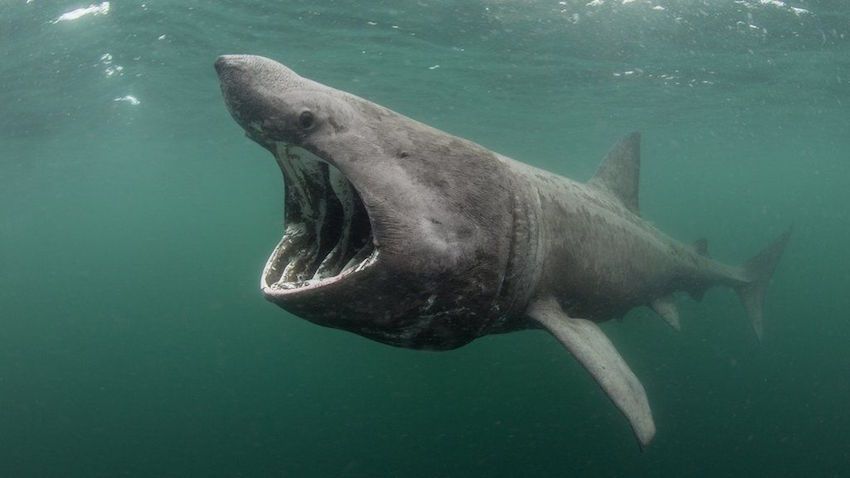A Donegal scientist has joined an international consortium of leading scientists and conservation organisations to call on the Irish Government to provide legal protection for the basking shark in Irish waters.
Dr Emmett Johnston, founder member of the Irish Basking Shark Group, co-signed an open letter to mark World Oceans Day, outlining why Ireland needs to legally protect this endangered species. Donegal is said to be a ‘hot spot’ for the sharks.
“We are privileged to have such a wonderful animal frequenting our waters, which are some of the most important globally for this endangered species, ” Dr Johnston told Donegal Daily.
“The scientific community have given their full support to list the basking shark under Section 23 of the Wildlife Act, now is the right time to protect them and their habitats”
You can support this campaign by signing the petition found at the following link; https://my.uplift.ie/petitions/provide-legal-protection-for-basking-sharks-in-ireland
Read the open letter below
A Chairde,
We write to register our concern about the status of the basking shark (Cetorhinus maximus) in Irish waters and ask respectfully that Ireland fulfils its international obligations as a party to the Convention on Migratory Species (CMS) and enact legal protection for the basking shark under the Wildlife Act.
Basking sharks are one of most iconic and mysterious marine species that visit Irish waters. This huge shark can grow up to 12 metres in length and it is habitually encountered ‘basking lazily’ on the surface of the sea during hot spring and summer days, where it feeds harmlessly on zooplankton.
Irish coastal waters are one of the few places globally that basking sharks regularly and predictably occur on the surface close to shore. Indeed, this surface swimming behaviour is the root of its deep cultural connections with western Irish coastal and island communities. Folklore, archaeological evidence and ancient written records suggest that An Liabhán gréine, or the Great Fish of the Sun, was encountered and fished long before the first detailed written accounts of their harpooning by the Irish whaling industry in the early 18th century. The best recorded modern fishery for the basking shark internationally was on Achill, Co. Mayo, Ireland. Here, thousands of sharks were caught and processed for their liver oil until the 1970’s. It may be a surprise for some to hear that it was legal to fish for the basking shark in Irish waters until 2001 and not prohibited in all EU waters until 2006. Due to these unsustainable practices the shark is now classified by the IUCN as endangered in the Northeast Atlantic and it was added to Appendix II of the Convention on Trade In Endangered Species (CITES) in 2003 and the Convention on Migratory Species (CMS) Appendix I & II in 2005.
This letter is written on the basis of emerging scientific evidence that indicates Irish territorial waters host a large proportion of the global population and are among some of the most important waters internationally for the species. Likewise, multiple tracking studies indicate that these wide-ranging sharks move rapidly and freely between Irish waters and those of our neighbours’ territorial seas. Ireland is one of the few remaining nations in the Northeast Atlantic that have not provided domestic legal protection for the basking shark despite being a signatory to several international treaties which list the species as endangered and threatened. While there is a moratorium on deliberately fishing for or landing the basking shark, significant challenges remain. Current threats to the survival of these magnificent animals include harassment and disturbance, ship collisions, and entanglement.
The Irish people are responding to the emerging biodiversity crisis with awareness and action. In a recent opinion poll carried out by the Marine Institute, 85% of respondents agreed the ocean is being damaged by human activities. Equally, our polling research suggests that the wider public support legal protection for basking sharks as well as strong action to reduce threats to endangered marine species. As an island people, we recognise the need to work collaboratively with our maritime neighbours to better protect our shared environment, especially the shared marine ecosystems that surround us and upon which our nation’s economic and cultural success is based.
Here, we call for Ireland to fulfil its international duty and enact legal protection for the basking shark under Section 23 of the Wildlife Act 1973, as amended. Furthermore, we ask that Ireland as a modern and responsible society champion the plight of endangered migratory marine species and provide a legal code of conduct to manage human interaction with these magnificent creatures when they are in our waters and on our watch.
Tags:








